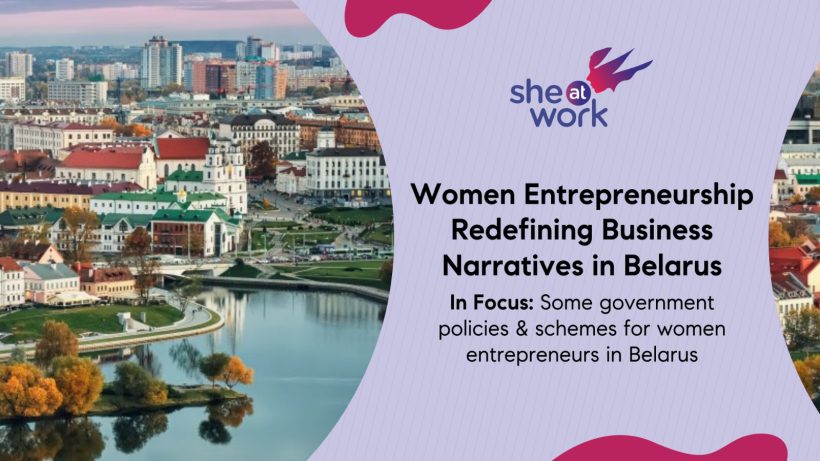In Focus: Some government policies & schemes for women entrepreneurs in Belarus
#BelarusBusinessWomen #WomenEntrepreneurs #InnovationInBelarus #EmpowerHerEconomy
In the vibrant landscape of Belarus, women entrepreneurs are emerging as catalysts for economic innovation and growth. Despite the challenges, they are breaking traditional molds, steering diverse enterprises, and contributing significantly to the nation’s entrepreneurial tapestry. From technology and agriculture to the creative industries, women in Belarus are carving their niche, redefining business norms, and inspiring a new era of entrepreneurship.
Let us look at some government policies and schemes for women entrepreneurs in Belarus, highlighting their pivotal role in shaping the country’s business landscape.
> National Policy
1995 can be considered the start of implementing gender equality policy in Belarus, when the Belarusian delegation took part in the Fourth World Conference on Women in Beijing. Committed globally to the empowerment of women, it is reflected in the Beijing Declaration and Platform for Action; and since then, certain progress has been made towards the achievement of the goals specified in the document. In June 1996 the National Plan of Actions to Improve the Situation for Women (1996-2000) was adopted. The Plan’s provisions were further developed and specified in the republican programme – “Women of the Republic of Belarus”, which was adopted by the Council of Ministers in August 1996. The establishment of the National Mechanism for the implementation of the state policy on women was almost complete.
Significantly, an outcome is the National Council on Gender Policy at the Council of Ministers of the Republic of Belarus. The National Council on Gender Policy at the Council of Ministers of the Republic of Belarus established in 2000 is a body, coordinates the implementation of the state policy on gender, and it comprises representatives of government institutions and women’s associations, and scientists.
Measures to support women entrepreneurship were included in 1997, in the Programme of the State Support to Micro-Entrepreneurship in the Republic of Belarus. Then a year later, in 1998 the Guidelines of State Family Policy were adopted by the Decree of the President of the Republic of Belarus, which described the measures to improve the economic self-reliance of families and women.
The main document designed to ensure the equal participation of men and women in all spheres of life is the National Plan of Actions to Ensure Gender Equality in the Republic of Belarus for 2011 – 2015; this document was adopted August 16, 2011 by the Resolution of the Council of Ministers of the Republic of Belarus. The National Plan covers the areas spelt out here: ensuring equal socioeconomic rights; ensuring equal access to social protection and healthcare; development of the system of gender education; information support to the interventions focused on ensuring gender equality; gender statistics and science, etc.
> Institutional and regulatory framework for SME policy
Since 2016, Belarus has made significant progress in the establishment of a comprehensive institutional and regulatory framework for SME policy. The country’s SME policy continues to be defined by the strategic guidelines set in the law “On SME Support” approved in 2010, which also set the current SME definition based on employment criteria. The Ministry of Economy’s Entrepreneurship Department has the mandate to develop SME policy.
Traditionally, SME policy has been organized around successive multi-year state programmes, the latest covering 2016-20. The programmes contain a list of support measures and initiatives, as well as a set of quantitative targets, related to SME contribution to employment and GDP, as well as targets related to the outputs of specific SME support programmes. Tracing back, in 2018, the Council of Ministers approved the first country strategy for SME development, which covers the period to 2030: “Belarus –a country for successful entrepreneurship” – a document that sets medium-term objectives for SME development for the first time. The Ministry of Economy led the elaboration of the strategy, with the support of a working group including the Council for Entrepreneurship Development, other central and local government bodies and private sector organizations.
The SME Development Strategy outlines the country’s main policy priorities for the SME sector. The focus is on – improving the business climate, promoting entrepreneurial activity and private enterprises, the introduction of measures supporting innovation, fixed investments and exporters and the strengthening of the institutional framework, with the establishment of new institutions to support SME policy implementation. SME policy implementation is currently conducted by a mix of institutions, such as the Ministry of Economy, the Belarusian Fund for the Financial Support of Entrepreneurs (BFFSE) under the Ministry of Economy, the Regional Executive Committees, and the state accredited business support infrastructure.
Since 2018, public-private dialogue has grown even stronger, with the expansion of the mandate of the Council for Entrepreneurship Development of Belarus, an advisory body under the President. Chaired by the First Deputy Prime Minister, the Council brings together successful representatives of the private sector. It meets on a quarterly basis and has a mandate to review and propose amendments to existing and draft legislation, and to propose government support programmes for entrepreneurs.
https://www.oecd-ilibrary.org/sites/67adad61-en/index.html?itemId=/content/component/67adad61-en
> Women in Business Programme
The European Union has worked tirelessly to defend women’s rights and to empower them to realize their full potential. Gender equality is at the heart of the EU’s Eastern Partnership initiative. It is vital to the individual lives of women as well as men, and essential for long-term democratic development. In its cooperation with Belarus, the EU is driving real change by strengthening women in business, providing opportunities for quality education and promoting a fair society.
The EU supports women entrepreneurs in Belarus through the Women in Business programme, which is implemented by the European Bank for Reconstruction and Development (EBRD). The support provided by the programme includes business advice, training and mentoring to women-led companies.
> European Bank for Reconstruction and Development (EBRD)
Belarus became one of the first countries to launch the Women in Business programme implemented by the European Bank for Reconstruction and Development (EBRD) in the countries of the Eastern Partnership, which include Armenia, Azerbaijan, Belarus, Georgia, Moldova, and Ukraine. The programme promotes women’s entrepreneurship and supports small and medium-sized enterprises (SMEs) led by women through access to finance and know-how solutions necessary for business growth.
The Women in Business programme in the Eastern Partnership countries is funded by the EBRD, the European Union, Sweden and the Early Transition Countries Fund. The programme helps women-led SMEs access both the finance and the advice they need to grow, offering financing through local partner financial institutions, technical assistance for participating financial institutions and business advice for women entrepreneurs. It helps business environment to flourish in Europe through financial investments, business services and involvement in high-level policy reform; it promotes entrepreneurship and changes lives. It has got a consistent goal of fostering and developing market economies whilst promoting innovation, growth, inclusion and transparency. Belarus has become one of the first countries to launch the Women in Business programme and this programme has been implemented by European Bank for Reconstruction and Development (EBRD).
This programme promotes women’s entrepreneurship and supports small and medium- sized enterprises which are led by women by providing them access to finance and know-how solutions necessary for business growth.
> EU4Business
EU4Business supports SMEs through improving access to finance, promoting better business regulations, improving services to business, and taking advantage of trade opportunities. EU4Business interventions result in creating and sustaining jobs, higher SME growth and increased SME exports.
It is dedicated to achieve stronger economy through economic development and support for market opportunities through joint policy initiative which aims to deepen and strengthen relations between European Union, its members and sic Eastern neighbours-Armenia, Azerbaijan, Belarus, Georgia, the Republic of Moldova and Ukraine. Its focus is increase in stabilisation and resilience. It fosters the small and medium sized enterprises in order to create more jobs and drive economic growth.
> Private Sector Development and Entrepreneurship
This is a USAID initiative in Belarus that strengthens and expands the private sector in Belarus by improving the business enabling environment, increasing the capacity of private sector actors, developing business support organizations and expanding access to finance.
It focuses on entrepreneurs – especially of micro, small and medium sized enterprises. USAID provides special assistance in advancing innovations and develops start-ups. It also enhances the business environment of Belarus by providing regulatory burden on businesses and introducing them to international market.
https://www.usaid.gov/belarus/private-sector-development-and-entrepreneurship
> UNFPA, Belarus
In 1994, the United Nations Population Fund (UNFPA) started working in Belarus. The Fund’s initiative serves the global goal of promoting the right of every woman, man and child in order to enjoy life of health and equal opportunities.
It is builds on national priorities and it works in collaboration with Government of the Republic of Belarus, UN agencies, and non-governmental organizations, international and national experts. The programmes cover some important areas like – reproductive health, population and development and gender equality.
https://belarus.unfpa.org/en/unfpa-belarus
> Convention on the Elimination of All Forms of Discrimination Against Women (CEDAW)
The Convention on the Elimination of All Forms of Discrimination Against Women (CEDAW) is the only comprehensive and universal international document committing the states to guarantee women’s rights and eliminate discrimination against women in such spheres as education, employment, healthcare, family policy, finance, law, and social policy.
The Convention was adopted by the Resolution of the UN General Assembly on December 18, 1979. It came into effect on the territory of the Belarusian Soviet Socialistic Republic on September 3, 1981 and remained in effect after Belarus became independent.
From 2000, Belarus has submitted Periodic Reports. In 2004 the Combined Fourth, Fifth and Sixth Periodic Report of Belarus was submitted (download link). And in 2009 the Seventh Periodic Report was submitted. On February 4, 2011 the CEDAW Committee adopted some measures outlined in the report on Belarus.










